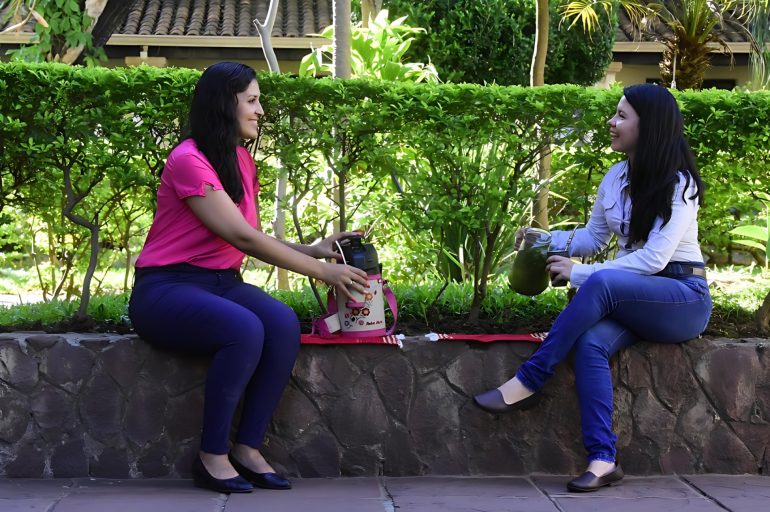Heading to, or just arrived Paraguay? To truly connect with the locals and understand their unique culture, you will need to go beyond standard Spanish and start exploring Paraguayan Spanish. Paraguay is a proudly bilingual country, with both Spanish and Guaraní as official languages.
More than 90% of Paraguayans speak Guaraní, often blending it seamlessly with Spanish in everyday conversations. This unique mix is called Jopara, and it has created a distinct form of Paraguayan Spanish filled with colourful and surprising expressions.
Learning these phrases will not only help you navigate daily life, but also earn you a few smiles from the locals. Here is a breakdown of some of the most common Paraguayan Spanish expressions you are likely to encounter, along with the situations in which you might hear them.
The everyday essentials
“¡Chake!” or “¡Hake!” – Be careful! / Watch out!
This is shouted to warn of danger. If you are about to step onto the road while a car approaches, or if a surface is slippery, someone might call out “¡Chake!” to protect you.
“De balde” or “Al pedo” – Useless / A waste of time
If plans collapse or efforts come to nothing, locals may say “Fue de balde” or “Fue al pedo: “It was useless” or “It was a waste of time”. For instance, if a meeting is cancelled after you have travelled across town, a friend might console you with this phrase.
“Vai-vai” – Badly done / Not right
When something goes wrong, or is not up to standard, people might say it is “vai-vai”. Imagine a poorly cooked meal, or a botched repair job; this expression sums it up perfectly.
“Me hallo” – I feel comfortable / I am happy
If you are enjoying yourself in a particular place, you can say “Me hallo aquí” (I feel happy here). The expression is often used when settling into a pleasant atmosphere among friends.
Time and plans (or the lack thereof…)
“Ahora después” – Now after (meaning later… perhaps)
This phrase can confuse newcomers in Paraguay. While the expression literally means “now after”, in reality it suggests a delay or even a vague promise. If someone tells you they will fix your phone “ahora después”, it could mean later today, tomorrow, or perhaps never at all.
“Me voy a ir a venir” – I am going to go to come
This curious phrase is often used as a polite refusal. Although it sounds like the speaker plans to do something, in practice it means the opposite: they are not going to do it. For example, if invited to a gathering they do not wish to attend, they might reply with this expression instead of directly saying “no”.
“De hoy en 8” – From today in eight (days)
This is the common way of saying “a week from today”. If you are invited to a party scheduled for next Friday, you may hear: “Nos vemos de hoy en 8” (See you a week from today).
“Me ganó toda la hora” – The time got away from me
A typical excuse for being late in Paraguay. If someone arrives half an hour late to meet you, they might shrug and say this phrase to soften the situation.
Social and grammatical quirks
“Pásame un poo” – Pass me a little bit
A shortened, informal way of saying “pásame un poco”. You will often hear this expression at family tables or with friends when asking for food or drink to be passed along.
“Ella es mi hermana, la mayora” – She is my older sister
In standard Spanish, one would say “la hermana mayor”. In Paraguay, however, it is common to use “la mayora” when referring to an older sibling.
“Se armó un guarara” – It turned into chaos / A big mess
This expression is used after confusion or drama. For example, if a football match ends in a fight, or a family argument becomes loud and dramatic, people may comment “Se armó un guarara”.
“Na” at the end – Please (softener)
Adding “na” to the end of a phrase is a linguistic habit that makes a request more polite. For instance, “Pásame na” means “Pass me (that), please”.
Final tip: Embracing Paraguayan Spanish
By keeping these Paraguayan Spanish expressions in your back pocket you will be better prepared to navigate conversations and connect with the warm and friendly people of Paraguay. Like in most places in the world, people greatly appreciate when visitors try to speak like locals, even if the pronunciation is not perfect. Use these phrases in markets, taxis or casual conversations, and you will often be rewarded with laughter, warmth and genuine connection.
Beyond simply learning expressions, it is worth noting that Paraguay is actively preserving its original language, an essential component of national identity. The Secretariat for Language Policy has launched a remarkable project to preserve the Guaraní language, aimed at recording spontaneous spoken narratives from native Guaraní speakers over the age of 60.
By using Paraguayan Spanish and understanding its Guaraní roots, you are embracing a living language shaped by both tradition and ongoing efforts to preserve it for future generations.
¡Buen viaje! (Have a good trip!)
About the author:
Gabriela Arca is an experienced English and Spanish teacher with over 20 years of teaching in Paraguay and abroad. She is a dedicated educator and passionate language professional.


